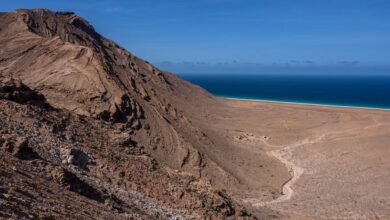Sanaa — As regional powers press the Yemeni opposition to join talks aimed at finalizing the abdication of President Ali Abdullah Saleh, Sanaa’s Tagheer Square continues to bring change to elements of society long neglected. In a country that suffers from the highest gender inequality rates globally, the number of Yemeni women joining the protests and playing critical roles in the opposition’s operations is steadily on the rise.
“When we saw that the students took to the streets and started to protest, we thought that if there is no support from others, all their efforts would be wasted,” said journalist Bilqees Nasser Alhanash. “I joined them since the first day of the sit-in at Sanaa University on 21 February.”
Western media often portrays Yemeni women as full-veiled, secluded and bereft of rights. And United Nations Development Programme (UNDP) statistics suggest a similar image of subjugation. According to the organization’s 2008 Gender Inequality Index, Yemen ranks number 138 of 138 countries listed with illiteracy rates among females registering 60 percent, opposed to 29 percent for males.
“We have been put in a cage by the current regime which spread high illiteracy and a very low awareness. When there is injustice and oppression, women are always the more vulnerable and suffer more than others,” says Dr. Amal Abdulkhaleq Hajar, head of Al-Resaliah Cultural, Social, and Charity Foundation. “The regime always tried to use religion in a bad way and thus helped extremism to spread. The essence of Islam is pure, promotes intellectual awareness, and encourages human beings to seek a dignified life.”
Despite the harsh climate for female advancement in Yemeni society, Hajar, a female, says some women have persevered and emerged in society's higher echelons, including the opposition’s organizatonal framework.
“There are many women very educated, who are raising awareness, working hard, and hoping for change.”
Gameela is a member of the Socialist party in Yemen. She is one of the many women who joined the protests in Yemen since the beginning of the uprising two months ago, joining forces with males to demand the ouster of Saleh’s regime. A variety of motivations continue to entice Yemen’s females to join the effort, including a sense of responsibility and harrowing exposure.
“One night, when security forces attacked peaceful protesters, a 17-year-old boy was shot in the head next to me,” said Gameela. “He turned to me saying: mom…Ashadu an la illaha illa Allah (I testify that there is no god but God) and then died in my arms.”
The involvement of women in Yemeni political dissent, however, is not strictly a recent phenomenon. Well-known activist and journalist Tawakkol Karman has been protesting in Yemen for the past few years. She was also one of the first to go to the streets demanding the overthrow of the regime in late January, after inspiration from the Tunisian revolution.
With discrimination rampant in Yemen, it is natural many of the women in the square were previously outspoken against the government. Current widespread dissent, however, has delivered increased impetus. On International Women’s Day, 8 March, women at Sanaa University Square marched to support the mothers of the uprising’s martyrs.
“Women are part of the nation and have an important role to play,” said Intisar Shaker, a Human Rights activist. “We have the same suffering and the same demands as our brothers.”
Despite the death of three protesters in Sanaa on Tuesday, bringing the total number of killed nationwide to 110 since February, the female demonstration turnout continues to increase. In flagrant defiance of Yemeni state television's attempt to portray them as "dishonorable women," females are providing aid, support and motivation to the protesters.
“We donated our own money, helped provide protesters with clothes or food, and we also brought flowers to security personnel to soften their hearts,” Gameela said.
Women are also participating in various committees at the square including security, organizations, media and medical committees.
“At the media committee, we are documenting everything with photos, articles, etc. and using social media such as Facebook or Twitter to coordinate and spread news,” said female demonstrator Bilqees Alhanash, while adding women continue the internal fight for greater influence in decision-making.
And according to Alia Shaker, another human rights activist, the demonstrations are ushering in social change before the impending political reshaping takes root.
“People are changing here. Boys are not flirting anymore with us,” says Shaker.
The change in male treatment towards females, according to Gameela, is resultant of the “much bigger fight [that] took place to break the fear barrier inside us.”
The end objective of the uprising, among men and women alike, appears to be the acquisition of a civil state, with equality of rights and justice for all. Women in particular, considering the repression they have suffered, are fighting for greater representation in the Yemen of the future.
After more than two of months of protests in Yemen, analysts and demonstrators alike think the end of the regime is close. The government, which seems to be falling apart at the seams, no longer claims legitimacy in the eyes of the population.
US and European officials in recent days and weeks have signaled their support for Saleh is waning. Western governments have long viewed the embattled president as a bulwark in the fight against Al-Qaeda, who staged various attacks on Western interests from remote bastions in Yemen’s lawless provinces.
Gulf Cooperation Council (GCC) nations on Wednesday proffered an initiative to convince Saleh to abdicate and help the opposition and government reach political compromise. The regime has expressed willingness to engage but, thus far, the opposition has been silent to the calls. Saleh flatly declined a transfer of power proposal on Saturday, insisting on retaining office until he oversees presidential and parliamentary elections later this year.
“This phase is like the last minutes of child labor,” Gameela said. “We’re almost done, but it’s very painful.”



